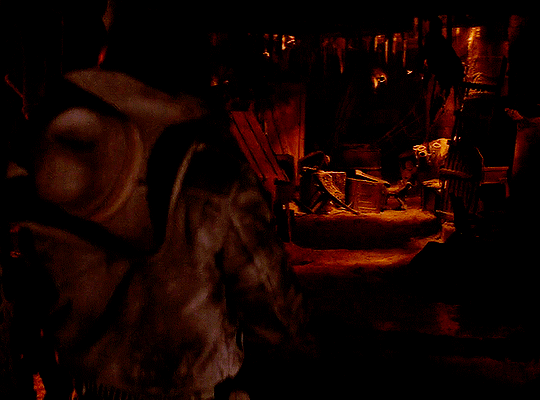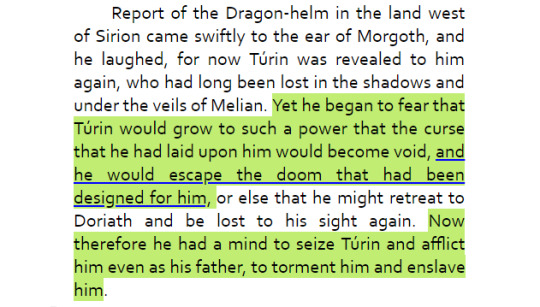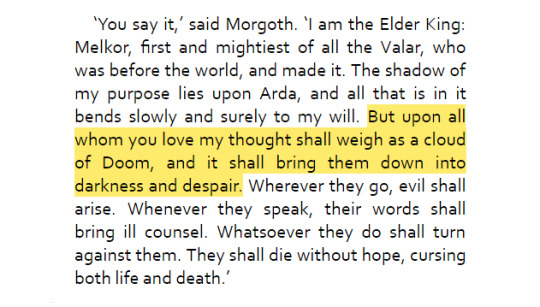#on a power level he's still baby compared to Morgoth...
Explore tagged Tumblr posts
Text
Maaan, Sauron almost acting as The Thing, with him using his blood to infect and control an entire city makes him even more frightening to me imo. The moment he entered Eregion, it was doomed. The moment they bring The Dog Thing into the research camp, it was over. You talked to Sauron and had a few laughs over a drink? You're under his control and basically a goner. Him being a shapeshifter, disguising himself and BARELY managing his elvish mask this season, just to get what he wants as soon as possible. Using doubt and lies and turning everyone against each other. GASLIGHTING EVERYONE. And who would know him better than Adar and what he's capable of at this point. No wonder the moment he finds out who he is, he wants to level Eregion to the ground before he escapes or takes on another mask.
"Childs, Mac wants the flamethrower."

#don't mind me just finishing up some gif sets and comparing things lol#on a power level he's still baby compared to Morgoth...#but his strength to completely manipulate everything he touches is horror levels and i love it#my love for the thing has no bounds and can talk for houuurs#shut it fuku#the rings of power#rings of power#trop#rop#sauron#annatar
23 notes
·
View notes
Note
So I’m thinking of a Narn AU where Húrin isn’t set on Thangorodrim and remains a prisoner in the fortress. His children are still cursed and he is still regularly shown images of them but it doesn’t take up all his time as it does in canon. I bring this up because I was curious what you think about how much of the bad things that befall Túrin and Niënor were explicitly planned before. Because I’ve always thought that the compelled incest part was at least in some way planned before and was very specifically about Húrin watching the ruining of his bloodline (which goes back to my other cursed HCs) in addition to the suffering it would bring his children.
Anyways no pressure to answer or anything I was just curious if this was something you had thought about
-@outofangband
(Disclaimer: I haven’t read much of the HoME besides what pertains the Narn, meaning I haven’t read any extended material on Melkor and so on.)
Honestly this is a very interesting question that I have posed myself before. It brings to mind this passage:

[Transcript:
Report of the Dragon-helm in the land west of Sirion came swiftly to the ear of Morgoth, and he laughed, for now (1) Túrin was revealed to him again, who had long been lost in the shadows and under the veils of Melian. (2) Yet he began to fear that Túrin would grow to such a power that the curse that he had laid upon him would become void, and he would escape the doom that had been designed for him, or else that he might retreat to Doriath and be lost to his sight again. (3) Now therefore he had a mind to seize Túrin and afflict him even as his father, to torment him and enslave him.]
My conclusions here are:
(1) Melkor’s ‘eye’, which Húrin had been forced to access as well, couldn’t penetrate Doriath under Melian’s power. Makes me think the whole time Túrin was growing up, Melkor had Húrin watch Morwen and Nienor’s growing misery in Dor-Lómin instead?
(2) Everyone has talked about this a hundred times because it is so incredible. So the doom was defeatable? So, cosmically speaking, there was some validation in Túrin’s methods of seeking war and power? Much to think about
(3) This bit is the only passage I can recall where instead of vague threats, the text gives us a concrete plan of Melkor’s for this family. When he sets Glaurung forth, we have absolutely no idea whether his actions were meticulously planned by Melkor, a mastermind, or just strokes of Glaurung’s own evil creative genius as derivated from Melkor’s will or whatever.
So. My opinion is that it isn’t a plan. First and foremost because I hate the anime villain type who was secretly controlling all the variables of the game, but also because I genuinely don’t get this aesthetic from Melkor/Tolkien. Melkor’s power is godlike; it doesn’t come from logic control over the material world, but from a more intimate relationship with what makes the material world itself.
Thinking of two events: one, when Melkor releases Húrin. Melkor has changed and posioned Húrin’s spirit, but Húrin isn’t aware of that. Húrin still hates Melkor, but, as we see in the Wanderings, he is still an agent of Melkor (to use a term @promin-blog used in [that interesting meta post you reblogged recently]). Compare that to Niënor, to whom something very similar happens: Glaurung poisons her spirit and then sets her free.
In my understanding, in neither of those two situations did Melkor or Glaurung know exactly what was going to be the outcome; they just knew it was going to be bad for their captives, and thus, good for them. Melkor is a being of chaos against the benign order of the world, so he fundamentally gains from an increase in the chaos, or a corruption in the order of the world. So when he explains the curse to Húrin, he says:

‘You say it,’ said Morgoth. ‘I am the Elder King: Melkor, first and mightiest of all the Valar, who was before the world, and made it. The shadow of my purpose lies upon Arda, and all that is in it bends slowly and surely to my will. But upon all whom you love my thought shall weigh as a cloud of Doom, and it shall bring them down into darkness and despair. Wherever they go, evil shall arise. Whenever they speak, their words shall bring ill counsel. Whatsoever they do shall turn against them. They shall die without hope, cursing both life and death.’
I take that at face value in terms of, this is literally how it works. He didn’t know exactly that Húrin would kill Mîm, bring the Nauglamír to Thingol, then fight with his once-beloved Haladin kin and cause their destruction, just like I don’t think Glaurung knew Niënor would find Túrin, fall in love with him and have his child. BUT they knew releasing these poisoned agents would benefit their cause one way or another. (I do think Melkor presumed correctly that Húrin might try to find Gondolin though! Hence the spies). So I guess I don’t agree with you that the incest was pre-planned, although I do think the ruining of Húrin’s bloodline was definitely a huge point that, in Melkor’s mind, was probably inevitable. If Túrin had, say, had a baby with Finduilas, Melkor would have gotten a hold of that baby too, at some point... I think when he says he is the master of the Fates of Arda, he means that his will has too powerful a hold over Arda to be broken, and not, necessarily, that he controls every detail of it.
That makes me think of that passage you mentioned recently in your blog:
“But ever the Noldor feared most the treachery of their own kin who had been thralls in Angband; for Morgoth used some of them for his evil purposes, and feigning to give them liberty sent them abroad; but their wills were chained to his and they strayed only to come back to him again” (”Of the Ruin of Beleriand”, p188, The Silmarillion)
It makes me wonder how many of these elves were, like Maeglin, aware of their own collaboration, and how many might have hated Melkor their whole lives while still being agents of his will 😬
It’s a super depressing thing, this possiblity that the Narn puts forth, of an otherwise free person being permanently and inescapably ruined for as long as you hold your material existance in this realm. It is the ultimate corruption of free will, because it means no matter which choices you make, they will always come to evil. You’re helpless: intent doesn’t matter, hard work doesn’t matter. I think it’s fitting with Melkor being a god, after all! That’s why it’s relevant that out of the five members of this family, only one is directly murdered by Melkor’s actions. The others take their own lives, although more indirectly in the case of Morwen - the only one who “was not conquered”. The rest of them, Túrin, Nienor, and Húrin, end up choosing death as an escape, and I think it is in a way because they ultimately understand that Melkor is playing on a godlike level that they, as mortals, cannot reach.
WHICH BRINGS ME TO ANOTHER DEPRESSING THING. We, as readers, have the benefit of knowing that Mandos exists and Eru exists and the Ainulindale happened. We have also read about Beren’s spirit lingering in Mandos waiting for Lúthien. So we ASSUME there is an afterlife for the second-born. We know Tolkien envisioned that, spiritual man that he was. But in the narrative, mortals themselves don’t have any reassurance of that!
So this exchange here becomes even more chilling:

So?
Did he lie?
#so did he lie? this is what used to keep me awake at night fam#did he lie?#melkor#the children of húrin#húrin#silmarillion#outofangband#btw menel we stan#i love the dantesque/medievalesque/aristotelesque touches of worldbuilding whenever Tolkien gives us them...#cw suicide discussion#a fairytale about slavery
13 notes
·
View notes
Text
Celebrían and Opinions Surrounding Her Departure from Middle-Earth
[TW for mentions of torture, death by suicide, mentions of rape, and kidnapping]
Celebrían is truthfully not a character I've given much thought on. To me, she was there to give Elrond a wife (Lúthien Jr needed a mother) and add more angst in his already angst-filled life by having the greatest healer in Middle-Earth fail to heal one of the people he loved the most. My opinions of her were neutral and my love of her dependent on each fanfic author's portrayal of her.
I think she was probably a genuinely pleasant person, probably politically unambitious unlike her mother Galadriel (but that's my own interpretation), but most of all unlike her cousins, Celebrían was a child born into peace. I say this because Celebrían was born in the early Second Age when Sauron hadn't started his affair with Celebrimbor been powerful enough to actually start thinking of taking over Middle-Earth. Celebrían was born in the aftermath of the War of the Wrath when Morgoth had fallen and when it looked like Middle-Earth was finally at peace again. And unlike her own children who were also born in peace, Celebrían wasn't born in the fading of her people, she wasn't born in the evening twilight of her people. I'd say she was born in the daylight of her people (at least in Middle-Earth) because in the Second Age peace lasted a pretty long time, enough that the wars with Sauron started when Celebrían was already well into adulthood.
Contrast this with Celebrimbor and Idril (and Orodreth if we're going with the version where he's Angrod's son) who were born early enough to see the Two Trees, but faced the Darkening, faced the Kinslaying, and in Idril's case, faced the Grinding Ice where she lost her mother. While these two had an early childhood in peace, their adolescence wasn't quite as kind. Not only that but I think in Beleriand they would've been more desensitised to the idea of pain, it's not just people dying but people being taken prisoners and tortured and twisted. It's a fact that they had to accept quite early in their lives, I would imagine.
So, moving onto the fact that Celebrían was kidnapped and tortured by orcs and had to sail to Valinor to find healing - this does not make her weak. I'm sorry, but it really grates on me whenever I see people dismissing Celebrían as weak because she was tortured and 'lacked strength of character' to recover in Middle-Earth. Often times these remarks are made by comparing her to Maedhros, who was tortured by Morgoth for 30 years but still recovered and was a leader of his people or some Finwëan relative who was tortured. Meanwhile, Celebrían apparently is 'a weak little flower' for succumbing to 'just days/weeks' of torture.
Let's take into the fact that perhaps Maedhros didn't have the choice Celebrían had, which was to sail. This guy was banned from Valinor. This guy also had high-strung younger brothers who frankly needed supervision. This guy also wanted to fuck Morgoth up and out of toxic levels of loyalty to his father and an Oath that may or may not have been physically binding, retrieve the Silmarils, so there's that. It's frankly very surprising that Maedhros was able to function as well as he did and keep in mind that his final fate is to fling himself into a volcano (fissure?) out of despair.
Moving onto the next point:
✨Torture is horrible. No matter who does it ✨
Objectively speaking, Morgoth sounds like a more shitty jailor than orcs but it still doesn't erase the horror of someone being tortured by another being. Celebrían being tortured is just as terrible as Maedhros or Celebrimbor being tortured. Because it's not really about who does the torturing, it's the fact that these people had to endure it in the first place. And well, torturing women tends to open the possibility of sexual assault and rape. Orc babies do come from somewhere . . . If I remember correctly, in somewhere (can't remember the name of the text) it's written that most Elves would choose to die than endure rape. They'd rather pull a Míriel than go through it. So there's that.
Also the "if Celebrían was a warrior then she wouldn't have been captured by orcs in the first place!" - and to this I say, Celebrían is not Naruto or Madara, she can't pull a bloody Rasengan or whatever Sharingan-no-the fuck technique of mass destruction. Even if Celebrían was a warrior, there are concepts like being outnumbered or drawn away from the battle. Celebrían's escort was scattered, I interpret this as them being assaulted by all sides which is why they strayed away from her or just brutally overwhelmed by numbers. I think whether she was a warrior or not, she must have put up a struggle because I don't think she was going to just lay down and let them take her. Either way, she was overpowered and taken captive.
Then her sons rescued her and she was brought back to Imladris and while Elrond could heal her physical injuries, he could not heal her spirit. Elrond couldn't heal Celebrían's trauma, no matter what he did she would always be reminded of her capture. And that's harrowing, isn't it? Imagine being surrounded by the people who love you the most and yet being unable to feel truly happy because the thought of the worst experience of your life is lingering in the back of your mind, ready to take to the forefront at any moment. What's more it's said that she couldn't find anymore joy in Middle-Earth, probably because she couldn't feel safe in her own home. The thing is that Celebrían was captured while on her way to visit her parents, so I imagine that if she had stayed in Middle-Earth and tried to visit her parents once more she would have had flashbacks of what happened. And that is tiring, the thought of something that once brought you joy now brings you fear instead is just sad, the distortion of the way you view things because something bad has happened is very much a real thing and I imagine that this is what she must've felt like.
In conclusion, I don't think her sailing to Valinor was selfish or weak at all. She realised that she couldn't heal in Middle-Earth, she couldn't be herself again in Middle-Earth and so she chose to leave to a place that might give her herself back. It's not selfish to realise that you're not okay and that you can take action to make you feel okay again, this is you taking care of yourself. Also, I think she saw how her suffering made the people she loved suffer as well so that could have been a motivator for her to seek Valinor. I think it takes a great amount of strength to leave everything you've ever known behind and seek the unknown, because keep in mind that even though her grandparents Finarfin and Eärwen are there and Finrod, she's never met these people. She grew up hearing stories about them, I would imagine, but that's who they are to her, stories not actual people. Same with going to Valinor, she's going to a place with different cultural divides than Middle-Earth, everything is hallowed there, everything is beautiful in a perfect way the same way everything in Middle-Earth is imperfectly beautiful. That's a little scary and I think we forget that Celebrían is a person in her own right, who shouldn't be defined by her capture and torture.
Thank you for coming to my Ted? talk.
#sorry for the ramble#celebrían#tw: mentions of torture#tw: mentions of death#tw: mentions of suicide#tw: mentions of rape#tw: mentions of kidnapping#the lord of the rings#lotr#tolkien
5 notes
·
View notes